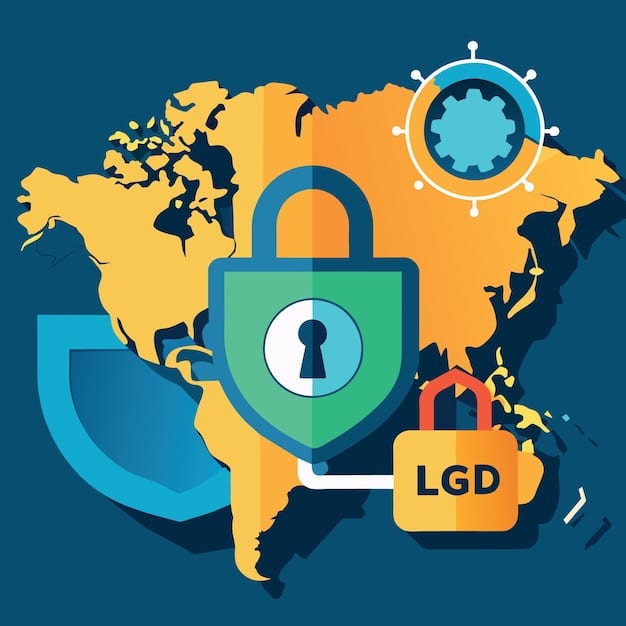Navigating Data Privacy: A Guide for Local Governments in 2025

What Local Governments Need to Know About the Updated Federal Data Privacy Laws involves understanding new compliance requirements, adapting data handling practices, and ensuring residents’ data is protected. This knowledge is crucial for maintaining public trust and avoiding legal repercussions.
Local governments are increasingly responsible for managing vast amounts of citizen data, making them prime targets for cyberattacks and subject to stringent data privacy regulations. The landscape of federal data privacy laws is constantly evolving, and it’s crucial for local governments to stay informed. What Local Governments Need to Know About the Updated Federal Data Privacy Laws in 2025 extends beyond mere compliance; it’s about fostering trust and protecting the community.
This article will delve into the key aspects of these updated laws, providing actionable insights and guidance to help local governments navigate this complex terrain effectively. Understanding these changes is not just a matter of legal obligation but a fundamental aspect of responsible governance.
Understanding the Scope of Updated Federal Data Privacy Laws
The updated federal data privacy laws aim to create a more comprehensive framework for protecting personal information held by various entities, including local governments. This involves broadening the definition of “personal information,” increasing transparency requirements, and strengthening enforcement mechanisms.
Key Changes in Data Privacy Definitions
One significant change is the expansion of what constitutes “personal information.” Previously, this might have been limited to names, addresses, and social security numbers. Now, it encompasses a wider range of data points, including IP addresses, browsing history, geolocation data, and even biometric information. Local governments must reassess their data inventories to identify all data that falls under this expanded definition.
Enhanced Transparency and Disclosure Requirements
The updated laws also mandate greater transparency regarding data collection and usage practices. Local governments need to provide clear and accessible privacy notices that explain what data is collected, how it is used, with whom it is shared, and what rights individuals have regarding their data. These notices must be written in plain language and made easily available to the public.
- Conduct a thorough data audit to identify all types of personal information collected and stored.
- Update privacy policies to reflect the expanded definition of personal information.
- Implement a system for managing data subject requests, such as access, rectification, and deletion.
- Train employees on data privacy best practices and the requirements of the updated laws.

Understanding the scope of these updated laws is the first step towards ensuring compliance and protecting citizen data. Local governments must proactively adapt their policies and practices to meet these new requirements.
Assessing Your Local Government’s Current Data Handling Practices
Before implementing changes, it’s crucial to assess your local government’s current data handling practices. This involves conducting a comprehensive audit of all data systems, identifying potential vulnerabilities, and evaluating existing security measures.
Conducting a Comprehensive Data Audit
The data audit should cover all departments and agencies within the local government, including law enforcement, public works, and social services. The goal is to understand what types of data are collected, where it is stored, how it is used, and who has access to it. This audit will provide a baseline for identifying areas that need improvement.
Identifying Potential Vulnerabilities
Once the data audit is complete, the next step is to identify potential vulnerabilities in the data handling process. This includes assessing the risk of data breaches, unauthorized access, and accidental disclosure. It also involves evaluating the security measures in place to protect data, such as encryption, access controls, and intrusion detection systems.
Evaluating existing security measures is crucial. Are your systems up-to-date with the latest security patches? Are your employees trained on how to recognize and respond to phishing attacks? Do you have a robust incident response plan in place?
- Inventory all data systems and applications.
- Map data flows to understand how data moves through the organization.
- Assess the security controls in place for each data system.
- Identify potential vulnerabilities and prioritize remediation efforts.
Assessing current data handling practices is a critical step in preparing for the updated federal data privacy laws. This assessment will help local governments understand their current risk profile and identify the areas that require the most attention. It is crucial for what local governments need to know about the updated federal data privacy laws.
Implementing Necessary Changes to Comply with New Regulations
Complying with the updated federal data privacy laws requires implementing a series of changes to policies, procedures, and technology infrastructure. This includes developing a comprehensive data privacy program, updating security measures, and providing ongoing training to employees.
Developing a Comprehensive Data Privacy Program
A data privacy program should outline the local government’s approach to data protection, including its privacy principles, policies, and procedures. The program should be aligned with the requirements of the updated federal data privacy laws and should be regularly reviewed and updated to reflect changes in the legal and technological landscape.
Updating Security Measures to Protect Data
In addition to developing a data privacy program, local governments need to update their security measures to protect data from unauthorized access and disclosure. This includes implementing encryption, access controls, intrusion detection systems, and data loss prevention technologies. It also involves conducting regular security assessments and penetration testing to identify and address vulnerabilities.
Providing ongoing training to employees is essential for ensuring that they understand their roles and responsibilities in protecting data privacy. Training should cover topics such as data privacy principles, security best practices, and incident response procedures.
- Appoint a Chief Privacy Officer (CPO) to oversee the data privacy program.
- Develop a data breach response plan.
- Implement data encryption and access controls.
- Provide regular training to employees on data privacy and security.

Implementing these changes is an ongoing process that requires commitment and resources. By taking these steps, local governments can protect citizen data and ensure compliance with the updated federal data privacy laws. It is important to understand what local governments need to know about the updated federal data privacy laws.
What Local Governments Need to Know About the Updated Federal Data Privacy Laws: Specific Requirements
The updated federal data privacy laws impose several specific requirements on local governments, including data minimization, purpose limitation, and data security. Understanding and implementing these requirements is crucial for compliance.
Data Minimization and Purpose Limitation
Data minimization requires local governments to collect only the data that is necessary for a specified purpose. Purpose limitation prohibits using data for purposes other than those for which it was originally collected, unless consent is obtained or required by law. These principles help to reduce the risk of data breaches and ensure that data is used responsibly.
Data Security and Breach Notification
The updated laws also establish minimum data security standards that local governments must meet. These standards include implementing reasonable security measures to protect data from unauthorized access and disclosure. In the event of a data breach, local governments are required to notify affected individuals and regulatory authorities within a specified timeframe.
Compliance with these specific requirements is essential for avoiding penalties and maintaining public trust. Local governments must proactively adapt their policies and practices to meet these standards.
- Implement data retention policies to ensure that data is not kept longer than necessary.
- Restrict access to data based on the principle of least privilege.
- Conduct regular risk assessments to identify and address data security vulnerabilities.
- Develop and implement a data breach response plan that complies with notification requirements.
Understanding the specific requirements of the updated federal data privacy laws is a critical component of compliance for local governments. By focusing on data minimization, purpose limitation, and data security, local governments can better protect citizen data and mitigate the risk of data breaches. What Local Governments Need to Know About the Updated Federal Data Privacy Laws should be a priority.
Training and Awareness Programs for Local Government Employees
Effective data privacy compliance relies heavily on the understanding and actions of local government employees. Therefore, comprehensive training and awareness programs are essential for ensuring that everyone understands their roles and responsibilities in protecting personal data.
Developing Engaging Training Modules
Training modules should cover a range of topics, including the basics of data privacy laws, internal data handling policies, recognizing and responding to security threats like phishing, and the specific procedures for handling data subject requests. To maximize engagement, the training should be interactive, use real-world examples, and be tailored to different roles within the local government.
Promoting a Culture of Privacy
Beyond formal training, it’s important to create a culture of privacy within the local government. This can be achieved through regular communications about data privacy, highlighting successful data protection initiatives, and recognizing employees who demonstrate a commitment to privacy. Emphasize the importance of data privacy not just as a legal requirement, but as a fundamental aspect of public service and building trust with citizens.
It’s also important to regularly update the training materials to reflect changes in the law and emerging threats. This ensures that employees are always equipped with the latest knowledge and best practices for protecting personal data.
- Conduct annual data privacy training for all employees.
- Offer specialized training for employees who handle sensitive data.
- Use a variety of training methods, such as online modules, in-person workshops, and simulations.
- Communicate regularly with employees about data privacy issues and best practices.
Investing in training and awareness programs is a crucial step for local governments to ensure compliance with data privacy laws. By empowering employees with the knowledge and skills they need to protect personal data, local governments can build a strong foundation for data privacy and security.
Staying Updated on Evolving Data Privacy Regulations
The field of data privacy is constantly evolving, making it essential for local governments to stay informed about the latest changes and developments. This includes monitoring regulatory updates, participating in industry forums, and seeking expert advice.
Monitoring Regulatory Updates and Industry News
Local governments should establish a process for monitoring regulatory updates from federal and state agencies, as well as industry news and trends related to data privacy. This can involve subscribing to newsletters, following relevant organizations on social media, and attending industry conferences and webinars.
Seeking Expert Advice and Collaboration
In addition to monitoring regulatory updates, local governments should seek expert advice from legal counsel, data privacy consultants, and technology vendors. These experts can provide guidance on how to interpret and comply with the latest regulations, as well as help to implement effective data privacy and security measures. Collaboration with other local governments can also be valuable, as it allows for the sharing of best practices and lessons learned.
Staying informed about evolving data privacy regulations is an ongoing effort that requires vigilance and proactive engagement. By investing in these efforts, local governments can ensure that they are always prepared to meet the challenges of protecting citizen data in a rapidly changing environment.
- Subscribe to data privacy newsletters and blogs.
- Attend industry conferences and webinars.
- Consult with legal counsel on data privacy matters.
- Participate in data privacy forums and working groups.
Staying informed on data privacy regulations is not just a task but a continuous process that allows local governments to adapt, improve, and protect themselves and their citizens in an evolving digital landscape. Continually assessing and acting on what local governments need to know about the updated federal data privacy laws is critical to staying compliant.
| Key Point | Brief Description |
|---|---|
| 🛡️ Compliance | Adhering to updated federal data privacy laws. |
| 🔒 Data Security | Protecting personal data from breaches. |
| 🧑🏫 Training | Educating employees on data privacy practices. |
| 🔄 Updates | Staying informed about new regulations. |
Frequently Asked Questions
Understanding updated data privacy laws is crucial for local governments to protect citizen data, maintain public trust, and avoid legal penalties. What Local Governments Need to Know About the Updated Federal Data Privacy Laws is fundamental for responsible governance.
Personal information now includes not just names and addresses, but also IP addresses, browsing history, geolocation data, and biometric information, expanding the scope of data protection.
Key steps include conducting data audits, updating privacy policies, implementing security measures, training employees, and developing a data breach response plan. What Local Governments Need to Know About the Updated Federal Data Privacy Laws helps guide these steps.
Data privacy policies should be reviewed and updated regularly, at least annually, to reflect changes in laws, technology, and organizational practices.
Local governments can foster a culture of data privacy through regular training, communication, highlighting successful initiatives, and recognizing employees who prioritize data protection ensuring everyone understands what local governments need to know about the updated federal data privacy laws.
Conclusion
Staying ahead of the curve regarding updated federal data privacy laws is not just a legal obligation, but a testament to a local government’s commitment to its citizens. By understanding and implementing the necessary changes, local governments can protect personal data, maintain public trust, and foster a culture of privacy.





